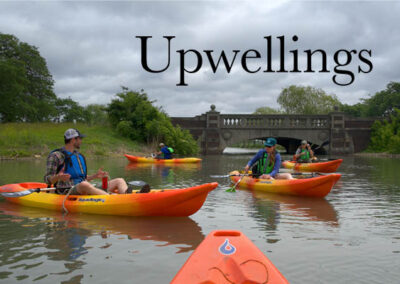Elementary students tackle critical Great Lakes and natural resource conservation issues, enhance their community, and enjoy a little hands-on learning along the way.
DenBleyker and students review debris they picked up at the island.With the sun shining and just a short walk from school, a class of energetic students recently crossed the bridge over the Thunder Bay River to Rotary Island in Alpena, Mich. These third graders from Lincoln Elementary, Alpena Public Schools were on their way to finalize a series of environmental studies and stewardship projects. This field trip culminated a year-long study inspired by their teacher Tina DenBleyker, who has opened her classroom doors into the community to enhance student learning through hands-on environmental studies.
Applying creative place-based stewardship education (PBSE) strategies, DenBleyker engages students through hands-on community connections and environmental experiences. At the heart of their project was Rotary Island – which students ‘adopted’ and in doing so built a mutually benefiting relationship with their local Alpena Rotary Club. Supported through the Northeast Michigan Great Lakes Stewardship Initiative (NEMIGLSI) network, this Lincoln Elementary educator and student team connected with community and conservation partners, including the Alpena Convention and Visitors Bureau, City of Alpena, Huron Pines AmeriCorps, Michigan State University Extension, Michigan Sea Grant, NOAA Thunder Bay National Marine Sanctuary, and U.S. Fish and Wildlife Service (USFWS).
This project illustrates a great example of how PBSE strategies enhance learning and foster community connections through environmental stewardship studies; resulting in:
- An engaging educational opportunity. Learning about life cycles is one example of a science learning goal for third grade students in Michigan; and what better way to learn about life cycles than exploring local monarch butterflies and their milkweed habitats. Reading and writing was another significant goal in this project both as students prepared for their projects and also as they reflected and wrote about their science explorations and findings. Students also gained valuable life skills working in teams, communicating with community partners, and leadership in implementing their projects.
- Watershed studies resulting in environmental stewardship. Students are conducting litter pickups, planting native pollinator gardens, and a variety of other efforts that enhance and beautify this island and public park. For example, the students pick up litter and tally the items found while accomplishing marine debris monitoring and prevention goals promoted by the Alliance for the Great Lakes Adopt-a-Beach program and NOAA Marine Debris program. While picking up the litter, students identified issues with fishing line – addressing this issue by partnering with Michigan Sea Grant to build and install monofilament recycling bins on the Island. Finally, their monarch lifecycle studies led to learning about pollinators and an eventual partnership with USFWS to plan and plant a native pollinator garden on the island.
- Valued community connections and contributions. Throughout the year students met and expanded their relationship with the local Alpena Rotary Club who own and manage the island. Mary Dunckel (also an MSU Extension Educator in Alpena County) provides leadership for Rotary Club, which welcomed and supports this school partnership on the island. Students learned more about the island and ways they could help when interviewing Rotarian Patrick Heraghty (Director of Community Foundation for Northeast Michigan). This partnership benefits school improvement goals and provides a community enhancement opportunity.
DenBleyker’s vision and planning for this stewardship project started last summer during the Lake Huron PBSE Summer Teacher Institute, a training sponsored by the NEMGLSI network and Sea Grant Center for Great Lakes Literacy. Here she learned about place-based stewardship education strategies; connected and traded ideas with other teachers, Great Lakes scientists and a variety of community partners; and gained resources in support of her work. DenBleyker jumped straight into PBSE programming with her students last fall with visits to the island – leveraging new partners and opportunities, navigating challenges, and celebrating successes. She shared her reflections as a new teacher getting started in PBSE during the 2017 NEMIGLSI Regional Networking Meeting. This summer she will share her experiences with new teachers as a lead teacher mentor during the very same Lake Huron PBSE Summer Teacher Institute. This year’s Institute is scheduled for August 14-18, 2017, in Alpena, and teachers interested can learn more and submit applications online. Applications are due July 27.
Michigan Sea Grant and Michigan State University Extension serve in providing leadership for the NEMIGLSI network, which is part of a larger, statewide network and partnership, the Great Lakes Stewardship Initiative (GLSI). Established in 2007 with funding from the Great Lakes Fishery Trust, the GLSI supports place-based stewardship education in schools and communities across Michigan. Partnerships are invaluable in our endeavor to support stewardship of our Great Lakes and natural resources. Through the NEMIGLSI network, and applied place-based education strategies, our educator partners are addressing critical Great Lakes issues.


